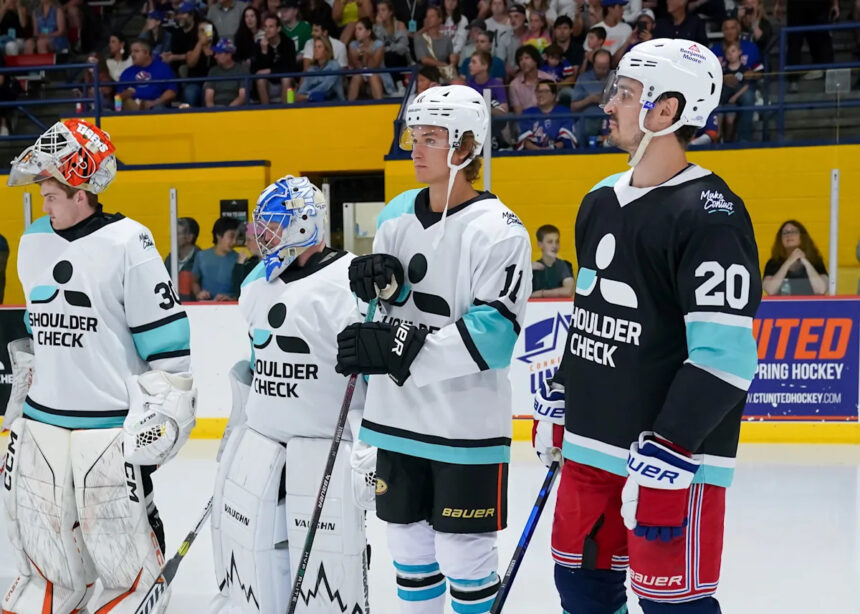As a player skates off after practice at the Nepean Sportsplex, his teammate taps him on the shoulder. “Hey, you good?” he asks. It’s not about the missed shot or tomorrow’s game plan—it’s a genuine check-in that might just save a life.
This simple gesture forms the foundation of The Shoulder Check, a grassroots mental health movement gaining serious momentum across Canadian hockey circles. Born from tragedy and championed by players who’ve faced their own battles with depression and anxiety, the initiative encourages teammates to literally and figuratively check in with one another.
“We lost three teammates to suicide in two years,” explains Marco DiSalvo, a former Junior A player who co-founded the movement after experiencing his own mental health crisis. “Guys were suffering in silence. We realized the culture had to change.”
The statistics behind the initiative are sobering. According to the Canadian Mental Health Association, 1 in 5 Canadians experiences mental health challenges annually, with men aged 18-34—the demographic that dominates competitive hockey—being particularly vulnerable yet least likely to seek help.
What makes The Shoulder Check unique is its organic integration into hockey’s existing culture. Rather than imposing formal therapy sessions that players might resist, it leverages the sport’s inherent physicality and team dynamics.
“Hockey players understand physical contact—the shoulder check is part of the game,” DiSalvo tells me during a phone call from his Toronto apartment. “We’re just redirecting that instinct toward emotional support.”
The movement began in Ontario junior leagues but has quickly spread to 27 teams across four provinces. NHL teams have taken notice too, with the Ottawa Senators and Montreal Canadiens incorporating elements into their development programs.
During a recent visit to a Senators practice facility, I watched as coach D.J. Smith ended the session with players pairing up for brief check-ins. The conversations lasted barely a minute each, but players seemed visibly more relaxed afterward.
“It’s changing the definition of toughness,” explains Dr. Hayley Wilson, a sports psychologist who consults with several OHL teams. “Mental resilience is finally being recognized as strength, not weakness.”
The initiative arrives at a critical moment. Recent research published in the Canadian Journal of Psychiatry revealed that competitive athletes experience depression at rates similar to non-athletes but are significantly less likely to disclose their struggles or seek treatment.
“Hockey’s culture has traditionally rewarded stoicism,” says Wilson. “Players internalize this belief that showing vulnerability undermines their value to the team.”
The Shoulder Check counters this by creating structured opportunities for vulnerability. Teams implement routine check-ins before practices, after games, or during road trips—moments when players might otherwise isolate themselves with negative thoughts.
Eric Landry, captain of the Gatineau Olympiques, admits he was skeptical at first. “I thought it would be awkward—a bunch of guys talking about feelings,” he tells me as we chat rinkside after morning skate. “But it’s actually straightforward. You ask if someone’s good, and you listen. If they’re struggling, you connect them with resources.”
Those resources are another crucial component. The initiative partners with provincial mental health organizations to provide teams with contact information for crisis lines, counseling services, and other supports. Players receive wallet cards with these details during preseason.
Parents have become vital allies too. Lisa Morelli, whose son plays Junior B in Smiths Falls, helped coordinate mental health first aid training for team families. “Hockey parents spend countless hours driving to games and tournaments,” she explains. “Those car rides are perfect opportunities for meaningful conversations.”
The movement’s growth hasn’t come without challenges. Some coaches initially worried it might distract from performance or create unnecessary emotional turbulence. Financial constraints have limited how quickly smaller programs can implement training.
“We’re not trying to turn players into therapists,” DiSalvo emphasizes. “The goal is recognition and referral—noticing when someone’s struggling and helping them find proper support.”
Early results appear promising. Teams implementing The Shoulder Check report improved cohesion and communication. Several players have credited teammates’ interventions with helping them access critical mental health services during personal crises.
The initiative has started extending beyond the rink. Schools near participating teams have reported hockey players initiating similar check-ins with classmates. Community forums hosted by The Shoulder Check regularly draw standing-room-only crowds in hockey towns from Thunder Bay to Halifax.
“It’s reshaping what hockey culture can be,” says Wilson. “These young men are learning skills that will serve them long after they hang up their skates.”
As hockey season intensifies and pressure mounts, The Shoulder Check’s founders hope their movement becomes as fundamental to the sport as tape-to-tape passing drills.
For DiSalvo, success means prevention. “If we can save even one life by normalizing these conversations, everything we’ve built will be worth it.”
In arenas across the country, that work continues—one shoulder tap at a time.






